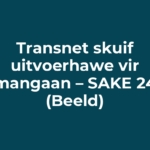Tshipi é Ntle ‘confident of securing rail capacity’ – Business Day
THE directors of Tshipi é Ntle Manganese Mining, a new mine that is under development near Hotazel in the Northern Cape, are confident the project will secure scarce railway capacity for production that will start in the first half of next year.
One of the key constraints for manganese miners in SA is securing rail allocation for the product that is used to harden steel. There is just 4,4-million tons of capacity available a year, falling well short of what producers at the world’s largest manganese resource are capable of producing.
Tshipi’s allocation will come at the expense of existing producers such as BHP Billiton and Anglo American, but Transnet has plans to add 1-million tons of capacity on the line to Port Elizabeth in the short term, and is studying options to grow capacity to as much as 18-million tons a year.
“We are confident, given our extensive discussions with the railway authorities, that we’ll export,” Saki Macozoma, chairman of Tshipi, said yesterday.
At the current price of $4,75 per pound of manganese, trucking ore to the port is not an option.
Tshipi has “pre-qualified” for allocation on the rail line under Transnet’s manganese export capacity allocation process. Durban is also an option for exports.
Tshipi has 163-million tons of reserves, giving it a life of more than 60 years. It will initially mine 2,4-million tons of manganese a year, of which 2-million tons will be lumpy ore and the balance fine material. There are no immediate plans to increase production due to constraints on the railway and questions about future demand for manganese, said Finn Behnken, a Tshipi director who looks after the 49,9% interest in the project by Australia’s Jupiter Mines.
Tshipi will not build a smelter to beneficiate the manganese due to electricity shortages and a big global surplus in manganese smelting capacity.

